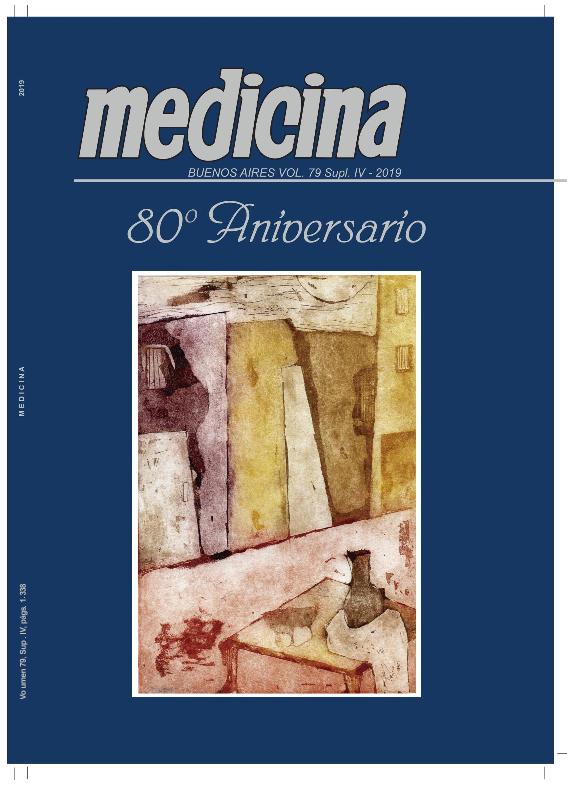Evento
Nanofilms of adsorbed thymol formed on titanium surfaces for biomedical applications. Antimicrobial activity and biocompatibility
Gonzalez, Ariel ; Miñan, Alejandro Guillermo
; Miñan, Alejandro Guillermo ; Grillo, Claudia Alejandra
; Grillo, Claudia Alejandra ; Schilardi, Patricia Laura
; Schilardi, Patricia Laura ; Fernandez Lorenzo, Monica Alicia
; Fernandez Lorenzo, Monica Alicia
 ; Miñan, Alejandro Guillermo
; Miñan, Alejandro Guillermo ; Grillo, Claudia Alejandra
; Grillo, Claudia Alejandra ; Schilardi, Patricia Laura
; Schilardi, Patricia Laura ; Fernandez Lorenzo, Monica Alicia
; Fernandez Lorenzo, Monica Alicia
Tipo del evento:
Reunión
Nombre del evento:
LXIV Reunión Anual de la Sociedad Argentina de Investigación Clínica; LI Reunión Anual de la Asociación Argentina de Farmacología Experimental; XXI Reunión Anual de la Sociedad Argentina de Biología; XXXI Reunión Anual de la Sociedad Argentina de Protozoología; IX Reunión Anual de la Asociación Argentina de Nanomedicinas y VI Reunión Científica Regional de la Asociación Argentina de Ciencia y Tecnología de Animales de Laboratorio
Fecha del evento:
13/11/2019
Institución Organizadora:
Sociedad Argentina de Investigación Clínica;
Asociación Argentina de Farmacología Experimental;
Sociedad Argentina de Biología;
Asociación Argentina de Ciencia y Tecnología de Animales de Laboratorio;
Sociedad Argentina de Protozoología;
The Histochemical Society;
Título de la revista:
Medicina
Editorial:
Fundación Revista Medicina
ISSN:
1669-9106
e-ISSN:
0025-7680
Idioma:
Inglés
Clasificación temática:
Resumen
Titanium (Ti) and its alloys are widely used in the construction of permanent orthopedic and cardiovascular implants. However, one of the most frequent causes of failures are bacterial infections by Staphylococcus aureus. This is aggravated by the abusive use of antibiotics that generate microbial resistance to conventional therapies. As a consequence, new antimicrobial nanotechnologies (AMN) emerge as promising alternatives to prevent prosthetic infections. The aim of this work was to evaluate the antimicrobial effect of an innovative AMN: thymol (TOH, phenolic phytocompound) nanofilms adsorbed on Ti (NPTOH-Ti) against S. aureus. The biocompatibility was also determined using preosteoblast cells (MC3T3-E1). To that end, 1 cm diameter grade 2 Ti discs were used and TOH was adsorbed onto their surface by 2 h immersion in 0.1 M TOH acid solution. NPTOH-Ti was detected by infrared spectroscopy (FTIR-ATR). The antibiofilm activity of NPTOH-Ti and Ti (control) was determined by immersing the metal discs in a suspension of S. aureus (108 bacteria/ml) for 3 h. Subsequently, the number of bacteria adhered on the discs was caunted after sonication by colony forming unit (CFU). In addition, Live/Dead (Invitrogen) staining was used to determine if the adhered bacteria were alive or dead. Finally, biocompatibility of NPTOH-Ti and Ti was assessed by staining the preosteoblast cells with acridine orange. The results showed that NPTOH-Ti has effective anti-biofilm properties. On the one hand, viable bacteria were not observed by the plating count method and Live/Dead staining exhibited only dead (red) bacteria on the surface. On the other hand, control Ti revealed 4 ± 0.5 x105 adhered bacteria that were mostly (95 %) alive (green). In addition, NPTOH-Ti and Ti showed similar cell adhesion and growth (107 ± 12 and 100 ± 16 % respectively; p>0.05). It was concluded that NPTOH-Ti are biocompatible and have anti-biofilm properties which make them promising to prevent prosthetic infections.
Palabras clave:
TITANIUM
,
NANOFILM
,
ANTIMICROBIAL
,
THYMOL
Archivos asociados
Licencia
Identificadores
Colecciones
Eventos(INIFTA)
Eventos de INST.DE INV.FISICOQUIMICAS TEORICAS Y APLIC.
Eventos de INST.DE INV.FISICOQUIMICAS TEORICAS Y APLIC.
Citación
Nanofilms of adsorbed thymol formed on titanium surfaces for biomedical applications. Antimicrobial activity and biocompatibility; LXIV Reunión Anual de la Sociedad Argentina de Investigación Clínica; LI Reunión Anual de la Asociación Argentina de Farmacología Experimental; XXI Reunión Anual de la Sociedad Argentina de Biología; XXXI Reunión Anual de la Sociedad Argentina de Protozoología; IX Reunión Anual de la Asociación Argentina de Nanomedicinas y VI Reunión Científica Regional de la Asociación Argentina de Ciencia y Tecnología de Animales de Laboratorio; Argentina; 2019; 51-52
Compartir



